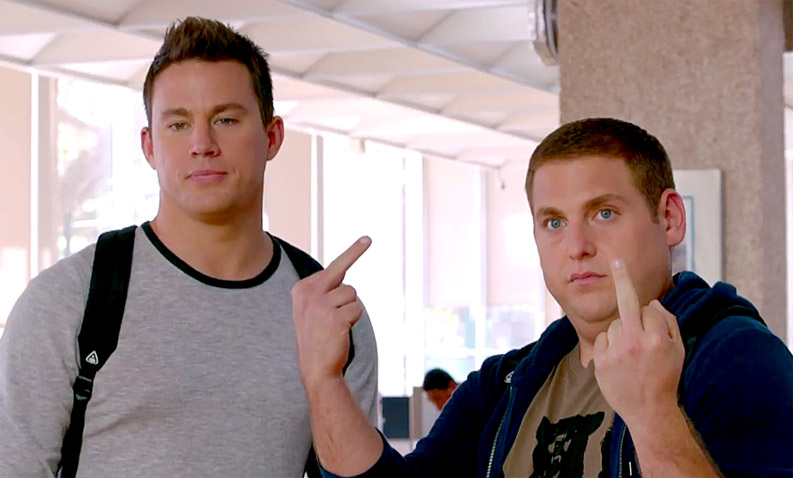Dude, don’t say, “Dude, you’re a fag.”
 When I reviewed 21 Jump Street two years ago, I praised the broad comedy about cops going undercover in high school for being very funny. But I was unnerved by how much of the humor was firmly based in homophobia. Officers Schmidt (Jonah Hill) and Jenko (Channing Tatum) are such good friends that they had to mock gay sex to make their friendship not seem too close, or inappropriately gay. I wrote that “an abnormally high – even for a vulgar, hard R comedy – percentage of the jokes in 21 Jump Street involve fear of gay sex. While Schmidt and Jenko state clearly that they don’t dislike gay people, their and the film’s extensive use of gay sexuality as something to mock and fear belies a homophobic subtext that isn’t very funny at all. The film is ultimately about male friendship, and it’s sad that the filmmakers, felt the need to basically scream ‘no homo!’ throughout the movie to make such a theme palatable to their target audience.” The movie was a big enough hit to garner a sequel, and I was worried that 22 Jump Street, in which our heroes go undercover in college, would continue the perpetuation of my sexuality as one big joke.
When I reviewed 21 Jump Street two years ago, I praised the broad comedy about cops going undercover in high school for being very funny. But I was unnerved by how much of the humor was firmly based in homophobia. Officers Schmidt (Jonah Hill) and Jenko (Channing Tatum) are such good friends that they had to mock gay sex to make their friendship not seem too close, or inappropriately gay. I wrote that “an abnormally high – even for a vulgar, hard R comedy – percentage of the jokes in 21 Jump Street involve fear of gay sex. While Schmidt and Jenko state clearly that they don’t dislike gay people, their and the film’s extensive use of gay sexuality as something to mock and fear belies a homophobic subtext that isn’t very funny at all. The film is ultimately about male friendship, and it’s sad that the filmmakers, felt the need to basically scream ‘no homo!’ throughout the movie to make such a theme palatable to their target audience.” The movie was a big enough hit to garner a sequel, and I was worried that 22 Jump Street, in which our heroes go undercover in college, would continue the perpetuation of my sexuality as one big joke.
I was particularly concerned when Jonah Hill – who is one of the film’s stars, producers, and writers – was caught on tape by TMZ calling a paparazzo a “faggot.” However, Hill’s swift and heartfelt apology was, as celebrity apologies go, rather amazing. He seems to understand how homophobic language works: “I said the most hurtful word I could think of at that moment and, you know, I didn’t mean this in the sense of the word…I didn’t mean it in a homophobic way. And I think that doesn’t matter, you know? How you mean things doesn’t matter. Words have weight and meaning and the word I chose was grotesque and no one deserves to say and hear words like that.” It was hard to reconcile this apology with 21 Jump Street’s gay panic, and it made me wonder whether the criticism of the film had gotten to him. Maybe 22 Jump Street would be different.
And it is. In a way. 22 Jump Street is, lucky for the gays, not a two-hour mockery of gay sex. At one point, Jenko even rages at one of the bad guys for calling him what Hill called the paparazzo: “In 2014, you can’t say the word ‘faggot’!” However, 22 Jump Street is unfortunately a two-hour mockery of gay love. There are long bits focused on how Jenko and Schmidt’s fights seem like those of lovers; one is about how Jenko’s desire to investigate another man is like asking to be able to see other people and another is done in the office of a therapist who thinks they’re lovers. This mockery is not particularly cruel, and the film, like its predecessor, is a celebration of male friendship, even if that friendship seems a bit gay. It’s fumbling towards an enlightened view of masculinity, but in 2014, “even if” is unnecessary and retrograde.
All of that said, the 22 Jump Street is funny. In addition to a bunch of silly but laugh-worthy lines about sequels having bloated budgets and a dearth of ideas, both Hill and Tatum get to show off their ever-increasing movie starshine. Hill, who has now been nominated for two Oscars, bases much of his comedy on the humiliation of the needy nerd, and Schmidt is a nice encapsulation of a Hill character. (His parotic take on slam poetry is the best scene in the film.) When I saw 21 Jump Street, I thought casting Tatum as dumb jock Jenko perfect for his limited skills, but since then, I’ve come to realize he does dumb and pretty as Marilyn Monroe did – with great and underappreciated skill. Tatum is as good at being mentally clueless and physically flawless as Hill is at being schlubby and smart. They are perfect foils for each other. Maybe 23 Jump Street will jettison the homophobia and their comic pairing will become less cynical and daring. Or better, it will focus on how Schmidt and Jenko have been in love with each other the whole time. That would make all of this worthwhile.
22 Jump Street
Directed by Phil Lord, Christopher Miller
Written by Michael Bacall, Oren Uziel, and Rodney Rothman
Starring Jonah Hill, Channing Tatum, and Ice Cube
Rated R




